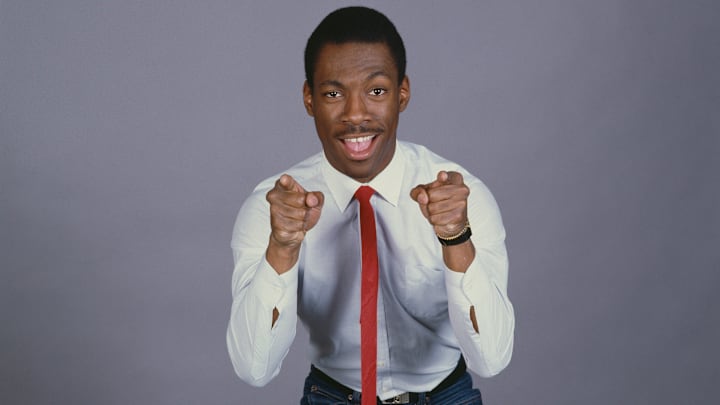There’s a long list of titles that come up when people talk about their favorite Eddie Murphy film. His debut in 1982’s 48 Hours as convict Reggie Hammond; his turn as Prince Akeem Joffer in 1988’s Coming to America; or his performance as shy Sherman Klump in 1996’s The Nutty Professor.
One answer you’re not likely to hear: The role of Lt. T.M. Landry in 1984’s Best Defense, which came out the same year as Murphy’s blockbuster turn as Axel Foley in Beverly Hills Cop. Why? Despite an ad campaign that relied heavily on Murphy, Best Defense is barely an Eddie Murphy film at all.
Of Paramount Concern
Best Defense was written by the husband-and-wife screenwriting duo Willard Huyck and Gloria Katz, who also penned 1984’s Indiana Jones and the Temple of Doom. The military-themed comedy (which Huyck also directed) is about an inventor named Wylie Cooper (Dudley Moore) who attempts to perfect a new gyroscope that’s later used in a conflict between Iraq and Kuwait. In the process, he becomes part of a love triangle (which includes Kate Capshaw, who co-starred in Temple of Doom) and must elude the KGB, which wants to acquire his device.
Using the armed services as a set dressing for comedy had worked before in films like Stripes (1981). Best Defense also had the benefit of starring Moore, who had been in hits including 10 (1979) and Arthur (1981). But the movie wasn’t likely to be held in similar esteem. When Paramount screened the movie in early 1984, test audiences didn’t find it particularly funny.
That left Paramount with few options. The studio had already invested $15 million into the production, so writing it off as a loss wasn’t appealing. The most promising solution was to recruit Murphy, who had emerged as a major movie star for the studio with 48 Hours and 1983’s Trading Places. For the former, Murphy was paid $200,000; for the latter, he earned $350,000. His fee shot up to $4.5 million for the forthcoming Beverly Hills Cop. Paramount offered Murphy $1 million plus a percentage of the profits if he agreed to shoot a few scenes for Best Defense.
While the salary was less than what he was making for Cop, Murphy only had to work for a couple of weeks. He agreed, acknowledging later that he “knew the script … was horrible.”
Because the movie had already been shot, Murphy’s participation would have to be grafted onto it. His character T.M. Landry is an Army lieutenant operating Cooper’s gyroscope in Kuwait two years after Cooper invented it; the film bounces back and forth between the two timelines, with audiences (hopefully) curious whether Moore’s invention will save Murphy. Of the movie’s 94-minute running time, Murphy appears for roughly 15 minutes.
Cop-Out
Best Defense opened in July 1984 to $8 million, enough to come in second behind the comedy hit Ghostbusters in its seventh week of release. But once word circulated that Murphy was little more than a cameo, earnings dropped by 60 percent for the second weekend. It ultimately grossed just under $20 million.
While he was billed as a “strategic guest star” in marketing, the intent was clearly to present Best Defense as a Murphy vehicle. The trailer for the film implied Moore and Murphy both had significant roles; advance material sent to theaters by Paramount promised the two would “join forces” in a movie “bringing together two of the screen’s … comic giants.” When that didn’t materialize, theater owners grew irate. They had bid on the film months prior and sight unseen, trusting Paramount would deliver.
“It’s a rip-off,” one theater owner told The Los Angeles Times.
Initially, Murphy’s team tried to pivot the misdirection as a benefit. “We wanted people to see him on the screens this summer,” Bob Wachs, his manager, told the Times. (Trading Places had opened in summer 1983, while Beverly Hills Cop was scheduled for December.)
But Murphy was aware of the backlash. When he appeared on Saturday Night Live a few months after Best Defense was released, Murphy told viewers that it “sucked real bad. ... I was like, 'What? How dare you give me a script like this? Oh, that much money? Let’s go!’”
While he was aiming for humor on SNL, his attitude about the movie was genuine. He told Moviegoer magazine that Best Defense represented a situation where he had “whored himself artistically.”
Still, 1984 was a banner year for Murphy. His Eddie Murphy: Comedian album won a Grammy; his pop single, “Party All the Time,” was also a hit. And his other major release, December’s Beverly Hills Cop, went on to earn $235 million domestically.
Huyck and Katz had less to look forward to: Their next project was 1986’s Howard the Duck.
